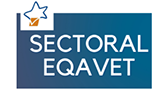About Sectoral EQAVET

Start: 01-09-2020 – End: 31-08-2023
Project Reference: 2020-1-SE01-KA202-078022
Project Reference: 2020-1-SE01-KA202-078022
Programme: Erasmus+
Key Action: Cooperation for innovation and the exchange of good practices
Action Type: Strategic Partnerships for vocational education and training
Project Summary
The overall aim of Sectoral-EQAVET is to develop guidelines with relevant indicators for VET authorities, employers, and VET providers for the assessment of the relevance of skills provided by VET institutions in relation to the skills demanded by employers.

Transparency and recognition of skills and qualifications are necessary to support learning and labour mobility and make VET provision efficient. The project “Sectoral EQAVET for design and delivery of VET” focus on facilitating transitions between different levels and types of learning, transitions to the world of work as well as transitions between different jobs. The project supports in particular better recognition and the validation – at local, regional, national, European or international level – of competences acquired through Vocational Education and Training (VET). This is possible if VET institutions increase the quality in VET through the establishment of feedback loops to adapt VET provision, including by setting-up or testing graduate tracking arrangements as part of quality assurance systems in line with the Council Recommendation on tracking graduates, and the recommendation on the European Quality Assurance Reference Framework for Vocational Education and Training (EQAVET).
The overall aim of Sectoral-EQAVET is to develop guidelines with relevant indicators for VET authorities, employers, and VET providers for the assessment of the relevance of skills provided by VET institutions in relation to the skills demanded by employers. The standards will include both core skills and transversal skills/key competences based on descriptors for indicators 5 and 6 in EQAVET. The main characteristic of the elaborated standards will be the development of guidelines and operational indicators with best practices, which enable measurement of VET outcome and enable authorities to introduce accountability for evidence-based vocational education. The Road Map and the Online assessment Loop for adaptation of VET to occupational profile with best practices will cover the following areas:
1. Employment outcomes;
2. Stakeholder satisfaction;
3. Achievement of vocational competence;
4. Achievement of key competences;
5. Lifelong learning;
6. Cost-effectiveness/funding;
8. Social (effectiveness, aspirations, personal attributes).
By developing these guidelines/recommendations on good practices and accompanying resources Sector-EQAVET will promote a new approach to a quality culture in VET, including the development methodology that continuously can measure and assess the gap between Vocational education and training (r: Rethinking Education: Investing in skills for better socio-economic outcomes).
The project result are:
1. Analysis of European best practices with regards to transparency of skills and qualification based on occupational requirements: Transferable results of existing best practices on methodologies and tools concerning the adaptation of VET education to required skills and competences by an occupation.
2. Guidelines/recommendations on good practices: These are a methodological guideline covering Analysis of Labour Market Information (LMI) provides the starting point for in-depth occupational analysis and standards development.
3. Tool for assessment of VET relevance to occupational profile (Webtool). This webtool is meant to help both VET (providers) and Sector (representatives) to reflect on their (joint) activities and results regarding an optimal match of VET supply with labour demands and provide them with recommendations to define, measure and improve that match as well as with good practices.
The overall aim of Sectoral-EQAVET is to develop guidelines with relevant indicators for VET authorities, employers, and VET providers for the assessment of the relevance of skills provided by VET institutions in relation to the skills demanded by employers. The standards will include both core skills and transversal skills/key competences based on descriptors for indicators 5 and 6 in EQAVET. The main characteristic of the elaborated standards will be the development of guidelines and operational indicators with best practices, which enable measurement of VET outcome and enable authorities to introduce accountability for evidence-based vocational education. The Road Map and the Online assessment Loop for adaptation of VET to occupational profile with best practices will cover the following areas:
1. Employment outcomes;
2. Stakeholder satisfaction;
3. Achievement of vocational competence;
4. Achievement of key competences;
5. Lifelong learning;
6. Cost-effectiveness/funding;
8. Social (effectiveness, aspirations, personal attributes).
By developing these guidelines/recommendations on good practices and accompanying resources Sector-EQAVET will promote a new approach to a quality culture in VET, including the development methodology that continuously can measure and assess the gap between Vocational education and training (r: Rethinking Education: Investing in skills for better socio-economic outcomes).
The project result are:
1. Analysis of European best practices with regards to transparency of skills and qualification based on occupational requirements: Transferable results of existing best practices on methodologies and tools concerning the adaptation of VET education to required skills and competences by an occupation.
2. Guidelines/recommendations on good practices: These are a methodological guideline covering Analysis of Labour Market Information (LMI) provides the starting point for in-depth occupational analysis and standards development.
3. Tool for assessment of VET relevance to occupational profile (Webtool). This webtool is meant to help both VET (providers) and Sector (representatives) to reflect on their (joint) activities and results regarding an optimal match of VET supply with labour demands and provide them with recommendations to define, measure and improve that match as well as with good practices.

